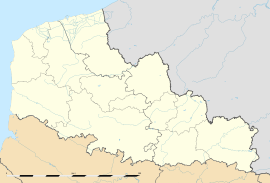Helfaut
| Helfaut | |
|---|---|
 Helfaut | |
|
Location within Nord-Pas-de-Calais region  Helfaut | |
| Coordinates: 50°41′54″N 2°14′38″E / 50.6983°N 2.2439°ECoordinates: 50°41′54″N 2°14′38″E / 50.6983°N 2.2439°E | |
| Country | France |
| Region | Nord-Pas-de-Calais |
| Department | Pas-de-Calais |
| Arrondissement | Saint-Omer |
| Canton | Arques |
| Intercommunality | Communauté d'agglomération de Saint-Omer |
| Government | |
| • Mayor (2008–2014) | Brigitte Leblond |
| Area | |
| • Land1 | 8.92 km2 (3.44 sq mi) |
| Population (2006) | |
| • Population2 | 1,744 |
| • Population2 Density | 200/km2 (510/sq mi) |
| INSEE/Postal code | 62423 / 62570 |
| Elevation |
23–95 m (75–312 ft) (avg. 92 m or 302 ft) |
|
1 French Land Register data, which excludes lakes, ponds, glaciers > 1 km² (0.386 sq mi or 247 acres) and river estuaries. 2 Population without double counting: residents of multiple communes (e.g., students and military personnel) only counted once. | |
Helfaut is a commune in the Pas-de-Calais department in the Nord-Pas-de-Calais region of France.
Geography
A large village situated 4 miles (6 km) south of Saint-Omer, at the D195 and D198 crossroads. It is located on a geological formation called the "plateau d'Helfaut", which separates the Aa valley to the north from the Lys valley, to the south. The commune is home to a unique geological heritage, resulting in an unusual landscape. The sides of the old quarries alongside the plateau display many geological strata. The quarries of Heuringhem and Blendecques have collapsed as a result of soil creep. The commune gave its name to 'Dilluvium d’Helfaut', a flint and clay formation rare in France and Europe. The commune is home to many rare and protected species in a heathland landscape, which is unusual for northern France and justified the creation of a nature reserve (Les Landes d'Helfaut).
Population
| Year | 1962 | 1968 | 1975 | 1982 | 1990 | 1999 |
|---|---|---|---|---|---|---|
| Population | 1000 | 1139 | 1248 | 1426 | 1671 | 1693 |
| From the year 1962 on: No double counting—residents of multiple communes (e.g. students and military personnel) are counted only once. | ||||||
History
The village was subject to much damage during World War II, as it was here that the Germans sited La coupole, an underground bunker, housing a huge concrete dome built by the Nazis between 1943 and 1944. Initially this bunker was to serve as a base to launch V2 rockets, but it never entered service because of the many bombing raids by the Allies. The Dome has been transformed into a museum.[1]
Places of interest
- The church of St.Fuscien and St.Victoric, dating from the thirteenth century.
- The church at Bilques.
- La Coupole : Second World War museum and visitor’s centre
- The monument known as the ‘Helfaut column’. See fr:colonne d'Helfaut (French)
See also
References
External links
- Helfaut on the Insee website (French)
- Helfaut on the Quid website (French)
| Wikimedia Commons has media related to Helfaut. |